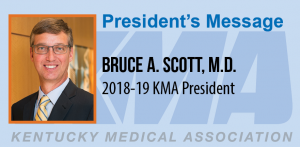Our society is more and more focused on today and now, and less concerned with planning for the future.
Nowhere is that more evident than health care. Our health care system is not designed to fix something today in order to save the patient – and the system – pain, time and money later. Primary care physicians and psychiatrists know this. Emergency room physicians encounter the effects. Endocrinologists and other specialists try to encourage patients to look at the long-term, while dealing with the short term. As an otolaryngologist, I treat patients everyday with conditions ranging from chronic infections to cancer that could have been addressed earlier with better outcomes and ultimately less expense.
Sometimes it seems “managed” care is simply about managing costs today, rather than providing care for the long-term health of individuals. Commercial payers must impress stockholders TODAY, no matter the consequences for a patient down the line. Government payers want to meet budget goals TODAY. This inability to stress the long-term costs and benefits of doing something now to avoid costs later has only exacerbated our societal health issues. Our system wants to save a nickel today by denying some sort of service or medication, which could avoid spending a dollar – thousands of dollars – five years from now.
Meanwhile, KMA is responding to try to get our patients, legislators and even health plans to look beyond the short term and see the advantages, and even savings, of health in the long run. Through our AIM initiative we hope to continue to tackle barriers impacting the health of Kentuckians.
Earlier this year, KMA advocacy helped pass landmark legislation that protects our patients from short term focused health plan prior authorization requirements and ensures our patients can get their needed medications for chronic illnesses.
We helped pass legislation to eliminate tobacco from Kentucky schools. And now we are partnering with the Foundation for a Healthy Kentucky on a tobacco-free schools initiative. Together, we will be providing signage to school districts across the state who comply with the recently passed tobacco-free schools law to encourage our youth and their communities to either quit using tobacco or prevent them from using in the first place. In addition, KMA will continue our advocacy to increase the tax on tobacco products and to raise the age to purchase tobacco to 21.
Despite our efforts last legislative session, health plans continue to demand prior authorization for medical assisted treatment for substance abuse, largely because the medications are expensive, without considering the staggering cost of continued addiction – measured in dollars and more importantly human lives. KMA will continue to work with legislators to correct this in the next legislative session.
Another example of short-term vision is health plans offering reduced incentives to “participating providers” resulting in narrow networks. As a result, more and more patients are caught in the middle with “surprise bills.” In July, KMA representatives traveled to Washington, DC to talk to our congressional delegation about this issue. Our conversations always began with our desire to protect patients from the financial impact of unanticipated medical bills, but we also emphasized the importance of an independent review process, similar to a law passed in New York State, which determines a fair payment for the care provided. Currently proposed federal legislation, supported by the health plans’ lobby, will harm patients access to care and ultimately the health of our nation. KMA and AMA will continue to advocate for fair contracting.
Through KMA, we are trying to improve the system for long-term health through our interventions with health plans, legislative advocacy and public health initiatives. KMA can’t do it alone, we need our physicians to continue to educate our patients and our legislators. We need our health care system to get on board. Otherwise, we will pay a dollar later after saving a nickel today. I would argue that we are already doing just that. Yesterday’s future is today.



